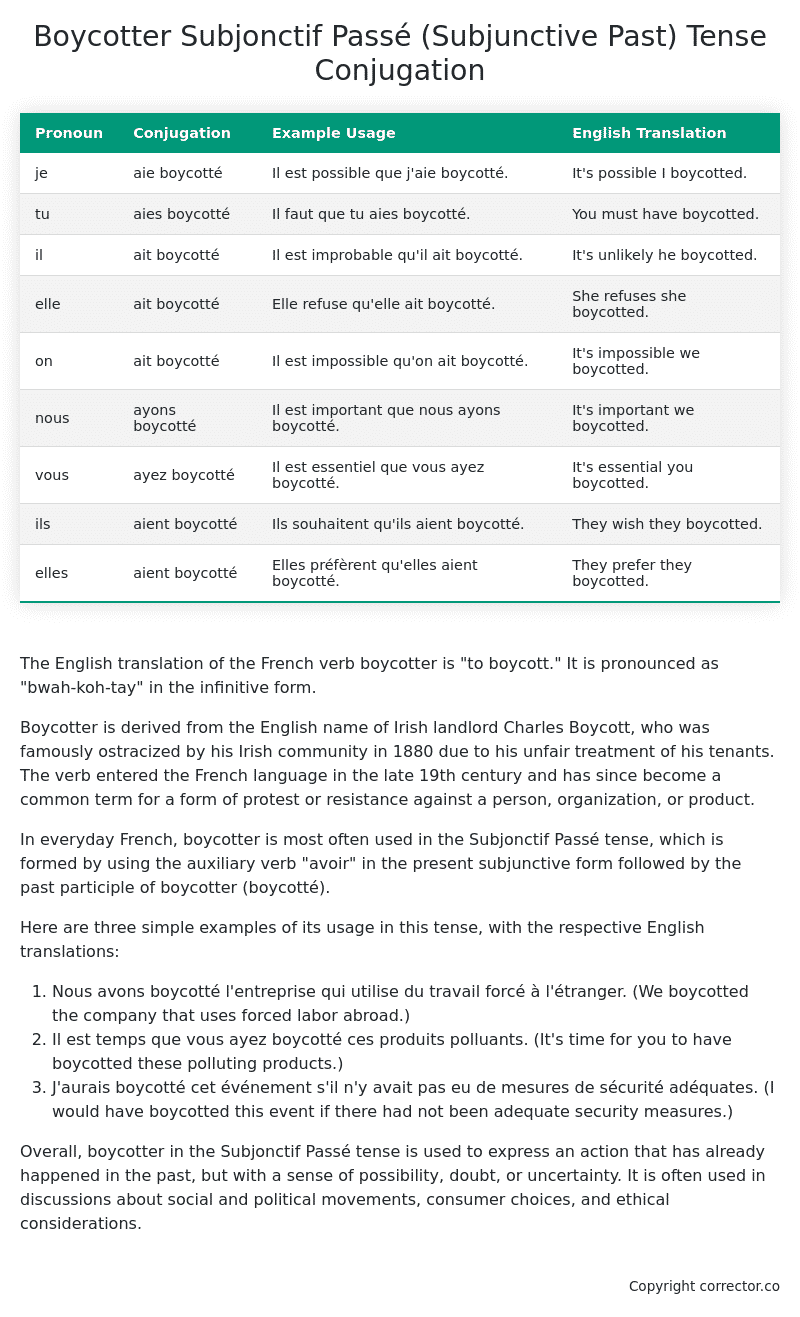Subjonctif Passé (Subjunctive Past) Tense Conjugation of the French Verb boycotter
Introduction to the verb boycotter
The English translation of the French verb boycotter is “to boycott.” It is pronounced as “bwah-koh-tay” in the infinitive form.
Boycotter is derived from the English name of Irish landlord Charles Boycott, who was famously ostracized by his Irish community in 1880 due to his unfair treatment of his tenants. The verb entered the French language in the late 19th century and has since become a common term for a form of protest or resistance against a person, organization, or product.
In everyday French, boycotter is most often used in the Subjonctif Passé tense, which is formed by using the auxiliary verb “avoir” in the present subjunctive form followed by the past participle of boycotter (boycotté).
Here are three simple examples of its usage in this tense, with the respective English translations:
- Nous avons boycotté l’entreprise qui utilise du travail forcé à l’étranger. (We boycotted the company that uses forced labor abroad.)
- Il est temps que vous ayez boycotté ces produits polluants. (It’s time for you to have boycotted these polluting products.)
- J’aurais boycotté cet événement s’il n’y avait pas eu de mesures de sécurité adéquates. (I would have boycotted this event if there had not been adequate security measures.)
Overall, boycotter in the Subjonctif Passé tense is used to express an action that has already happened in the past, but with a sense of possibility, doubt, or uncertainty. It is often used in discussions about social and political movements, consumer choices, and ethical considerations.
Table of the Subjonctif Passé (Subjunctive Past) Tense Conjugation of boycotter
| Pronoun | Conjugation | Example Usage | English Translation |
|---|---|---|---|
| je | aie boycotté | Il est possible que j’aie boycotté. | It’s possible I boycotted. |
| tu | aies boycotté | Il faut que tu aies boycotté. | You must have boycotted. |
| il | ait boycotté | Il est improbable qu’il ait boycotté. | It’s unlikely he boycotted. |
| elle | ait boycotté | Elle refuse qu’elle ait boycotté. | She refuses she boycotted. |
| on | ait boycotté | Il est impossible qu’on ait boycotté. | It’s impossible we boycotted. |
| nous | ayons boycotté | Il est important que nous ayons boycotté. | It’s important we boycotted. |
| vous | ayez boycotté | Il est essentiel que vous ayez boycotté. | It’s essential you boycotted. |
| ils | aient boycotté | Ils souhaitent qu’ils aient boycotté. | They wish they boycotted. |
| elles | aient boycotté | Elles préfèrent qu’elles aient boycotté. | They prefer they boycotted. |
Other Conjugations for Boycotter.
Le Present (Present Tense) Conjugation of the French Verb boycotter
Imparfait (Imperfect) Tense Conjugation of the French Verb boycotter
Passé Simple (Simple Past) Tense Conjugation of the French Verb boycotter
Passé Composé (Present Perfect) Tense Conjugation of the French Verb boycotter
Futur Simple (Simple Future) Tense Conjugation of the French Verb boycotter
Futur Proche (Near Future) Tense Conjugation of the French Verb boycotter
Plus-que-parfait (Pluperfect) Tense Conjugation of the French Verb boycotter
Passé Antérieur (Past Anterior) Tense Conjugation of the French Verb boycotter
Futur Antérieur (Future Anterior) Tense Conjugation of the French Verb boycotter
Subjonctif Présent (Subjunctive Present) Tense Conjugation of the French Verb boycotter
Subjonctif Passé (Subjunctive Past) Tense Conjugation of the French Verb boycotter (this article)
Subjonctif Imparfait (Subjunctive Imperfect) Tense Conjugation of the French Verb boycotter
Subjonctif Plus-que-parfait (Subjunctive Pluperfect) Tense Conjugation of the French Verb boycotter
Conditionnel Présent (Conditional Present) Tense Conjugation of the French Verb boycotter
Conditionnel Passé (Conditional Past) Tense Conjugation of the French Verb boycotter
L’impératif Présent (Imperative Present) Tense Conjugation of the French Verb boycotter
L’infinitif Présent (Infinitive Present) Tense Conjugation of the French Verb boycotter
Struggling with French verbs or the language in general? Why not use our free French Grammar Checker – no registration required!
Get a FREE Download Study Sheet of this Conjugation 🔥
Simply right click the image below, click “save image” and get your free reference for the boycotter Subjonctif Passé tense conjugation!

Boycotter – About the French Subjonctif Passé (Subjunctive Past) Tense
Formation of the Subjonctif Passé
Everyday Usage Patterns
Interactions with Other Tenses
Present tense
Future tense
Conditional
Summary
I hope you enjoyed this article on the verb boycotter. Still in a learning mood? Check out another TOTALLY random French verb conjugation!


